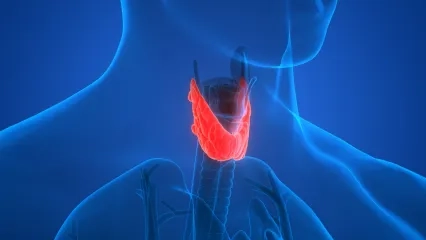Alo Yeditepe
Alo Yeditepe
T4 Hormone in 13 Headings
What is T4 Hormone? Changes in the T4 hormone can lead to symptoms such as unexplained weight gain or weight loss, hair loss, insomnia, and fatigue. In our article, we have explained everything about the elevation and lowness of the T4 hormone, which provides the entire balance of the body, and their symptoms and T4.
What is the T4 hormone and what is its role in the body? Prof. Dr. Erhan Ayşan, General Surgery & Endocrine Surgery Specialist from Yeditepe University Hospitals Parathyroid Transplant Clinic, explained the changes in the body, all symptoms, and treatment for the elevation and lowness of the T4 hormone.
What is T4? What does it do in the body?
The thyroid gland secretes two hormones, called T3 and T4. T3 is often inactive, and the main functional hormone is T4. The T4 hormone participates in all kinds of metabolic processes in the body. It affects the speed of thinking, muscle strength, eye movements, mimic movements, bowel movements, and hair loss rate.
Why is the T4 test done, and in which cases do the doctors request the T4 test?
Since the T4 hormone has such a wide range of effects in all areas of metabolism such as bowel movements problem, hair loss, facial mimic movements, and thinking speed, the T4 test may be necessary for all kinds of diseases that cannot be diagnosed in the body.
What should be the value range for T4?
The T4 hormone is a hormone found in the blood at the nano level, that is, at the level of one-millionth of a milliliter. As the value of T4 in the blood is so low, different biochemistry measurement devices in health institutions perform measurements with different techniques. Therefore, normal, and high values in terms of the ideal value range for T4 vary depending on the device.
At what value is T4 considered high?
Values exceeding the upper limit of the normal range according to the type of device used for measurement are considered high.
Are there symptoms of T4 elevation?
Of course, there are symptoms of T4 elevation, but unfortunately, they are often insidious.
- The most common symptom that we see is nervousness. The patient behaves extremely nervously in the face of situations that he/she did not react to before.
- Sleep disorder
- Weight loss
- Hyperactivity
- Rapid sweating
- Not being affected by cold
- Enlargement of the eyes in some cases.
What could be the cause of T4 elevation, are there any triggering diseases?
The most common cause of T4 elevation is the enhanced functioning of the thyroid gland. This most often happens when the body stimulates the thyroid gland by producing a self-harming protein. This is called Graves' disease. In this disease, the body produces a protein that damages its own thyroid gland, and this protein constantly stimulates the thyroid cells, causing them to produce excess T4 hormone.
What does T4 elevation mean and what should be done?
The meaning of T4 elevation is the enhanced metabolic rate. If we compare the human body to a machine, if T4 is high, this machine works at high speed. Just as any gear, screw or mechanic can malfunction in a machine that is constantly working at high speed, similarly, when the human body works at high speed, organs are damaged.
In this case, the first thing to do is to find the cause of the disease. For this, some blood tests and most importantly thyroid ultrasounds are required. Blood tests and ultrasound show us both the diagnosis of the disease and how we can treat it after diagnosis.
How to increase the T4 hormone?
T4 hormone can only be increased by taking T4-containing medications, but this is a procedure that must be done under the control of a doctor. Unfortunately, in my daily clinical practice, I see people taking and using these medications for weight loss. This situation is very wrong and unfortunately has sad consequences. While people cannot lose weight, they suffer from many metabolic and cardiovascular diseases.
At what value is T4 considered low?
The T4 hormone is a hormone found in the blood at the nano level, that is, at the level of one-millionth of a milliliter. As the value of T4 in the blood is so low, different biochemistry measurement devices in health institutions perform measurements with different techniques. Therefore, normal, and low values vary depending on the device.
If T4 is low, can it be understood with symptoms? What are the symptoms?
The symptoms of low T4 are often insidious, just like the symptoms of high T4.
The symptoms of low T4 in order of frequency are as follows:
- Weight gain (However, the following point should be well understood: There are many reasons for weight gain and low T4 is only one of them.)
- Weakness
- Fatigue
- Reluctance
- Having chills rapidly
- Being affected by cold very quickly
- Hair loss
- Constipation
- Bloating
- Skin dryness
What could be the reason for low T4? Are there any triggering diseases?
The most common cause of low T4 is Hashimoto's disease. In this disease, the body produces a self-harming protein that kills the cells in the thyroid gland. Think about it this way, while you had 1 million thyroid cells before having Hashimoto's disease, this number gradually decreases after you get Hashimoto's disease, and when it reaches a critical value (for example, 800.000 cells), the symptoms just mentioned begin to appear. As the disease progresses and cell death continues, the symptoms increase.
What does it mean if T4 is low, what should be done if T4 is low?
Low T4 means a low metabolic rate. If T4 is low, the body works slowly and cannot find its rhythm.
In this case, it causes the symptoms such as:
- Lack of movement
- Long sleep
- Weight gain due to the inability to burn the calories taken
- Chills as a result of insufficient blood supply to the skin
- Hair loss and so on.
The first thing to do in patients with low T4 is to find the cause of the disease. For this, some blood tests and most importantly thyroid ultrasounds are required. Blood tests and ultrasound show us both the diagnosis of the disease and how we can treat it after diagnosis.
What happens if low T4 is not treated and how is low T4 treated?
In patients who cannot be diagnosed for a long time, the slowdown in movements and fatigue become the most prominent findings. When weight gain is added to this situation, the patient gradually begins to break away from daily life physically and psychologically. If the patient is a student, he/she starts to experience failures in his/her studies, and if he/she is an employee, he/she experiences inefficiencies in business life.
The treatment of low T4 is extremely easy. When patients are given the right dose of thyroid medications and are followed up by a specialist physician, they quickly recover and regain their former health.
About
Faculty and Year of Graduation:
Istanbul University, Cerrahpasa Faculty of Medicine, 1994
”
See Also
- What is a Parathyroid Adenoma? Symptoms and Treatment
- What is Calcitonin Hormone? Calcitonin Hormone Deficiency
- If the Size of the Thyroid Nodule is Over 4 cm, Be Cautious!
- How Does High Calcium in Blood Cause Complaints?
- A First in the Literature: Parathyroid Cell Obtained from Thyroid Stem Cell
- Diagnosis in Thyroid Diseases
- Assessment of Hyperthyroidism
- Hashimoto's Thyroid Disease
- Thyroid Tumor (Cancer)
- Graves' Disease
- Thyroid Nodules
- Thyroid Surgery
- Assessment of Hypothyroidism
- What is the Harm of High Calcium in the Blood?
- Frequently Asked Questions in Thyroid Diseases
- Atomic Therapy (Radioactive Iodine Therapy)
- Which Thyroid Nodule Can Be Treated Without Surgery?
- She Was Relieved of Her Pain When the Missing Parathyroid Gland Was Found in The Chest Cavity
- Thyroid Storm Can Turn Life Upside Down
- Recovered From Thyroid Nodule with Needle Melting Method
- Stress Triggers Thyroid Diseases; These Occupations Are At Risk!
- Turkish Physician Developed a Novel Method for Parathyroid Transplant
- What Should Be Considered After Parathyroid Surgery?
- Parathyroid Diseases and Treatment
- They Said It Was Thyroid Cancer, But It Turned Out to Be Parathyroid Adenoma!
- The Frequency of Thyroid Nodules and Thyroid Cancer in Young People is Increasing!
- Thyroid Cancer Treatment Is Possible Without Removing The Entire Thyroid Gland
- Thyroid Storm
- Questions About Thyroid Diseases
- Thyroid Diseases
- Goiter (Thyroid Gland) Biopsy
- Radiofrequency Therapy in Thyroid Nodules
- What Is Autoimmune Hypoparathyroidism or Hypocalcemia?
- What Is The Loss of Low Calcium Level in Blood?
- What Is The Symptoms of Calcium Level Elevation (Hypercalcemia)?
- How It Is Made The Parathyroid Adenoma Operation?
- What Is Parathyroid Hyperplasia?
- Parathyroid Tumors
- What Are The Parathyroid Glands?
- The Incidence of Thyroid Cancer Has Increased! There is Turkey in the Research!
- Key Surgery Performed In Turkish Hospital For First Time
Alo Yeditepe






